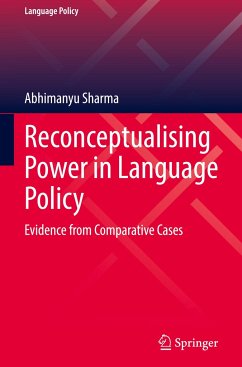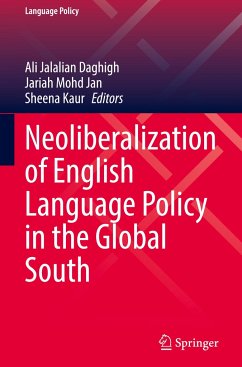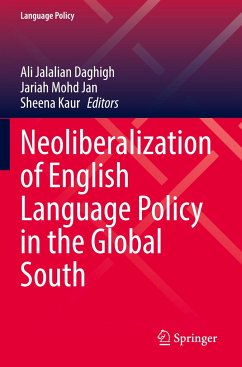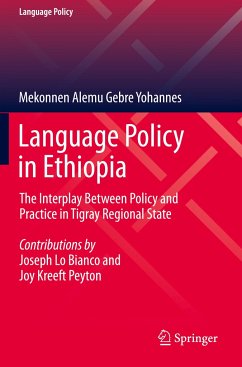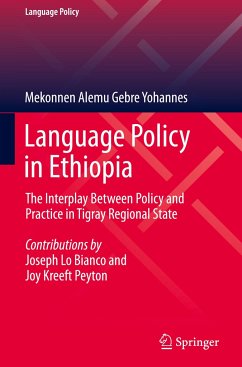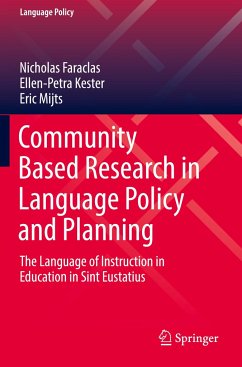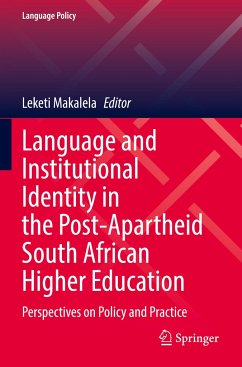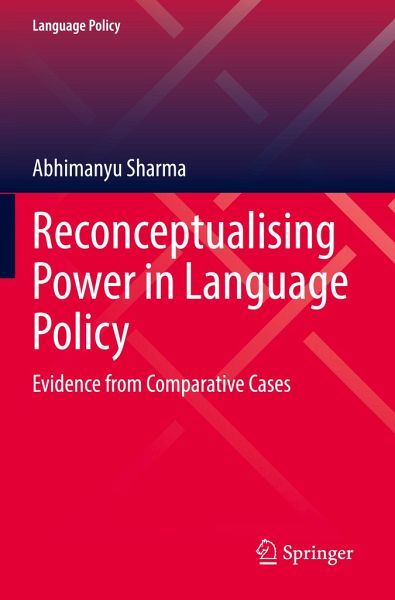
Reconceptualising Power in Language Policy
Evidence from Comparative Cases
Versandkostenfrei!
Versandfertig in 6-10 Tagen
75,99 €
inkl. MwSt.
Weitere Ausgaben:

PAYBACK Punkte
38 °P sammeln!
This book aims to expand the theoretical framework of and counter the Eurocentric narratives in language policy research, by comparing policies of EU and India and demonstrating the importance of taking a comparative perspective while studying language policies. This book challenges the notion of macro-level power in language policy research and offers evidence that, in democratic frameworks, macro-level power is not absolute. It is not uniform across policy domains, but rather susceptible to pressure, especially in the domains of healthcare and social welfare.This book makes three important c...
This book aims to expand the theoretical framework of and counter the Eurocentric narratives in language policy research, by comparing policies of EU and India and demonstrating the importance of taking a comparative perspective while studying language policies. This book challenges the notion of macro-level power in language policy research and offers evidence that, in democratic frameworks, macro-level power is not absolute. It is not uniform across policy domains, but rather susceptible to pressure, especially in the domains of healthcare and social welfare.
This book makes three important contributions to the theory of language policy by:
Arguing for the need to reconceptualise macro-level powerProposing 'Categories of Differentiation' as a new analytical tool for policy researchDemonstrating that socio-political changes are reflected at the textual level
This book is of interest to researchers working on language policies and those investigating language related legislation across different policy domains, to practitioners and policymakers in language policy, as well as to graduate students conducting comparative policy research.
"This is a much valued and timely book making a strong case for the subject of language policy across Europe and India. The large comparative case studies of four distinctive states across Europe and India in a simple descriptive mode makes the reading of this book enjoyable. The domains of administration, legislation, healthcare and social welfare are undoubtedly novel ways to deal within the concept of language policy in a wider sense. The author uses discourse analysis to bring out the relationship between intention, explanation and interpretation of a phenomenon like language policy and its implementation. The social diversity as expressed in linguistic mapping is well captured in the novel idea of "categories of differentiation"both as a normative methodological tool and its historical-empirical manifestation." - Asha Sarangi, Jawaharlal Nehru University, New Delhi.
This book makes three important contributions to the theory of language policy by:
Arguing for the need to reconceptualise macro-level powerProposing 'Categories of Differentiation' as a new analytical tool for policy researchDemonstrating that socio-political changes are reflected at the textual level
This book is of interest to researchers working on language policies and those investigating language related legislation across different policy domains, to practitioners and policymakers in language policy, as well as to graduate students conducting comparative policy research.
"This is a much valued and timely book making a strong case for the subject of language policy across Europe and India. The large comparative case studies of four distinctive states across Europe and India in a simple descriptive mode makes the reading of this book enjoyable. The domains of administration, legislation, healthcare and social welfare are undoubtedly novel ways to deal within the concept of language policy in a wider sense. The author uses discourse analysis to bring out the relationship between intention, explanation and interpretation of a phenomenon like language policy and its implementation. The social diversity as expressed in linguistic mapping is well captured in the novel idea of "categories of differentiation"both as a normative methodological tool and its historical-empirical manifestation." - Asha Sarangi, Jawaharlal Nehru University, New Delhi.





